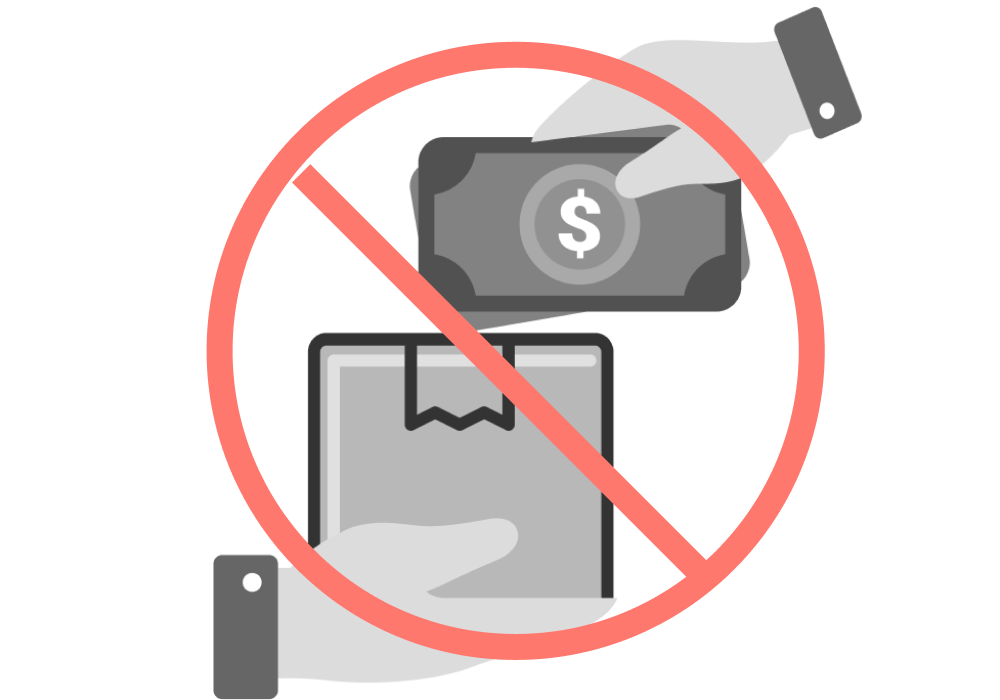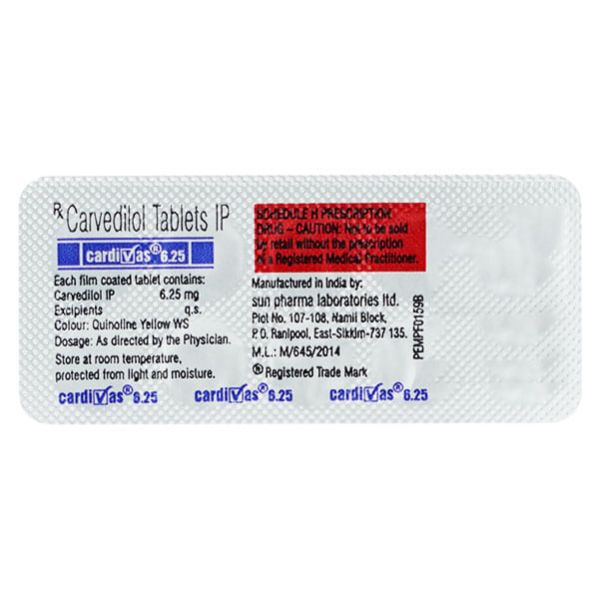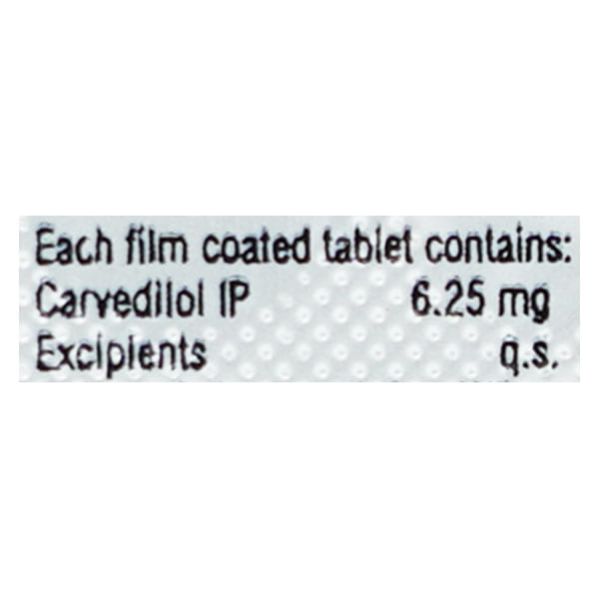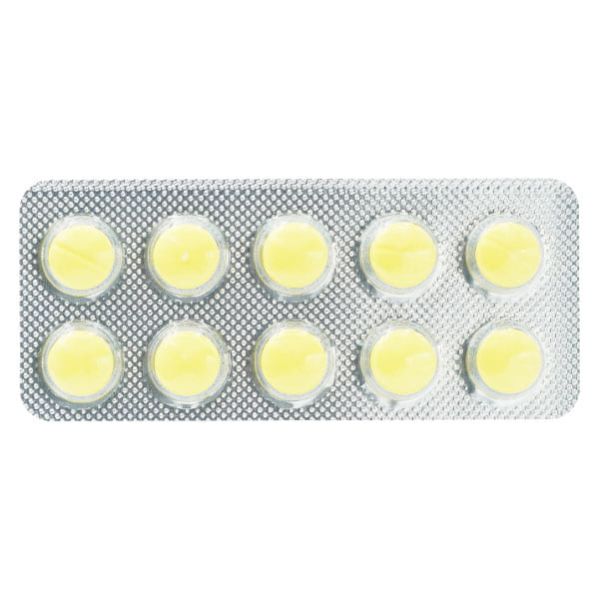Cardivas 6.25mg Tablet 10'S
CARDIVAS 6.25MG TABLET is a heart medicine used in the management of high blood pressure, angina (chest pain) and heart failure.
₹ 70.00
₹76
(Inclusive of all taxes)
-

No Warranty
-

COD Not Avilable
-

Non Returnable
-

Non cancelable
About this item
INTRODUCTION ABOUT CARDIVAS 6.25MG TABLET
CARDIVAS 6.25MG TABLET is a cardiac medicine used in the management of hypertension, angina and congestive heart failure. It contains a medicine called Carvedilol which is a beta-blocker that works by improving heart functions and reduces strain of the heart.
Take this medicine at the same time each day as directed by your physician. Swallow the medicine with a glass of water after meals. Do not stop taking CARDIVAS 6.25MG TABLET without consulting your doctor.
Before taking CARDIVAS 6.25MG TABLET, inform your doctor if you have asthma or breathing difficulties, severely low blood pressure, liver problems, kidney problems, diabetes, thyroid problems, poor blood circulation in the body, cold hands and feet, phaeochromocytoma or problems in adrenal gland. Do not take CARDIVAS 6.25MG TABLET without consulting your doctor if you are pregnant or breastfeeding.
The most common side effects of taking CARDIVAS 6.25MG TABLET are dizziness, headache, tiredness, weakness, low blood pressure, diarrhea, stomach pains, constipation, tingling and numbness, fluid retention, weight gain or increased blood sugar and cholesterol levels. Consult your doctor if any of these side effect worsens or experience severe chest pains, low sugar levels or passing less urine with swelling in hands, feet and body parts.
USES OF CARDIVAS 6.25MG TABLET
CARDIVAS 6.25MG TABLET is used in the management of the following heart conditions:
HOW CARDIVAS 6.25MG TABLET WORKS
CARDIVAS 6.25MG TABLET contains a medicine called Carvedilol which is a beta-blocker that works by blocking both beta and alpha receptors on blood vessels and the heart.
For hypertension, carvedilol blocks beta-1 receptors in the heart, which slows the heart rate and reduces the force of heart contractions, lowering blood pressure. It also blocks alpha-1 receptors on blood vessels, causing them to relax and widen, which further reduces blood pressure.
For angina (chest pain), carvedilol decreases the workload on the heart by reducing the heart rate and lowering blood pressure, which helps improve oxygen supply to the heart muscle and relieves chest pain.
In heart failure, carvedilol’s effects on both beta and alpha receptors reduce strain on the heart, improve heart function over time, and help prevent worsening of symptoms by protecting the heart muscle from stress and damage.
DIRECTIONS FOR USE
- Take CARDIVAS 6.25MG TABLET as advised by your physician.
- Swallow the medicines with a glass of water.
- Do not crush or chew the medicine.
- Your doctor will decide the correct dose and duration for you depending on your age, body weight and disease condition.
SIDE EFFECTS OF CARDIVAS 6.25MG TABLET
COMMON SIDE EFFECTS OF CARDIVAS 6.25MG TABLET
- Headache, dizziness, tiredness, weakness
- Low blood pressure especially after standing up, slow heartbeat
- Swelling of arms and legs
- Infections of upper respiratory tract or urinary tract
- Anaemia
- Fluid retention and weight gain
- Increase in cholesterol levels
- Abnormal blood sugar levels
- Feeling depressed
- Vision problems, sore or dry eyes
- Poor blood circulation in your arms and legs, tingling and pain in your fingers and a pain in your leg which gets worse when you walk
- Nausea, vomiting, diarrhea, stomach pains, indigestion, constipation
- Breathing problems
- Hair loss
- Being unable to get an erection (erectile dysfunction)
Stop taking CARDIVAS 6.25MG TABLET and consult your doctor immediately if you experience any of the following side effects:
- an allergic reaction (swelling of the face, lips, throat and mouth, leading to breathing difficulty or swallowing; skin rash, hives
- chest pain accompanied by shortness of breath, sweating and feeling sick
- decreased urination often with swelling of legs (indicates problems with kidneys)
- low blood sugar (hypoglycaemia) which may lead to seizures or unconsciousness
WARNING & PRECAUTIONS
PREGNANCY
Monitoring requiredCARDIVAS 6.25MG TABLET should be used in pregnant women only if it is considered necessary by the physician.
BREASTFEEDING
ContraindicatedCARDIVAS 6.25MG TABLET is generally not recommended for use in breastfeeding women as it is not known if this medicine passes into breast milk.
DRIVING AND USING MACHINES
Use with CautionDo not drive or operate any machines if you feel drowsy after taking CARDIVAS 6.25MG TABLET.
ALCOHOL
Consult your doctorAvoid consumption of alcohol while taking CARDIVAS 6.25MG TABLET because it might make you dizzier.
KIDNEY
ContraindicatedCARDIVAS 6.25MG TABLET is not recommended for use in patients with kidney problems.
LIVER
ContraindicatedCARDIVAS 6.25MG TABLET is not recommended for use in patients with liver problems.
ALLERGY
ContraindicatedDo not take CARDIVAS 6.25MG TABLET if you are allergic to Carvedilol or any of the other ingredients of this medicine.
LUNGS
ContraindicatedCARDIVAS 6.25MG TABLET is not recommended for use in patients with breathing problems such as asthma or other lung diseases.
HEART DISEASE
ContraindicatedCARDIVAS 6.25MG TABLET is not recommended for use in patients having severe heart failure, conduction defect of the heart or heart block, AV heart block grade II or III, sick sinus syndrome (sino-atrial block), slow heartbeat, cardiogenic shock, very low blood pressure, unstable heart failure, Prinzmetal’s angina (chest pain at rest).
USE IN PEDIATRICS
ContraindicatedCARDIVAS 6.25MG TABLET is generally not recommended for use in children and adolescents under 18 years of age.
USE IN GERIATRICS
Use with CautionCARDIVAS 6.25MG TABLET should be used with caution in elderly patients aged above 65 years.
OTHERS
CARDIVAS 6.25MG TABLET is not recommended for use if you have:
- severe hardening of arteries affecting the circulation in legs or feet
- unmanageed pheochromocytoma
- metabolic acidosis
- glucose or galactose intolerance
- receiving diltiazem or verapamil injection or infusion
Before taking CARDIVAS 6.25MG TABLET, inform your doctor if you have:
- diabetes
- Raynaud’s syndrome (poor circulation affecting hands, feet or lower legs causing cold hands and feet or pain)
- Raynaud’s syndrome (cold feet and hands) or peripheral vascular disease causing cold hands and feet)
- thyroid problems
- previous history of a serious allergic reaction
- desensitisation therapy
- psoriasis
- wear contact lenses (as they may cause dry eyes)
- surgery
- taking other antihypertensives like debrisoquine
INTERACTIONS
A. Drug-Drug interactions:
Before taking CARDIVAS 6.25MG TABLET, inform your doctor if you are taking any of the following medicine:
- antidiabetics (Ex. insulin, metformin)
- antidepressants (Ex. moclobemide, reserpine, amitriptyline, fluoxetine, paroxetine, isocarboxide, phenelzine, phenothiazines, haloperidol)
- cardiovascular agents (Ex. clonidine, doxazosin, terazosin, amiodarone, diltiazem, verapamil, amlodipine, nifedipine)
- atracurium besilate (medicines used to relax muscles and also used in anaesthesia)
- corticosteroids Ex. prednisolone
- cimetidine (medicines used to manage ulcers)
- erythromycin (used to manage infections)
- medicines used to manage cough and cold (Ex. ephedrine or pseudoephedrine)
- medicines used for migraine (Ex. clonidine, ergotamine)
- ketoconazole (antifungals)
- amylobarbitone (to induce sleep)
- prochlorperazine (antiemetics)
- cyclosporine (a medicine used after organ transplantation)
- non-steroidal anti-inflammatory drugs. Ex. ibuprofen, diclofenac
- medicines used for hormone replacement therapy (Ex. oestrogens) or contraceptive pills
- rifampicin (anti tuberculosis)
- beta-agonist bronchodilators
Overdosage:
If you or anyone else accidentally take too much of CARDIVAS 6.25MG TABLET, consult your doctor immediately or visit the nearby hospital. Symptoms of overdose are dizziness, faintness, sick, breathlessness or wheezy, very drowsy or experience convulsions.
SYNOPSIS
| Drug | : | Carvedilol |
| Pharmacological Category | : | Beta-blockers |
| Therapeutic Indication | : | Hypertension, Angina pectoris and Congestive heart failure |
| Dosage Forms | : | Tablet |
0 Review Of Product Cardivas 6.25mg Tablet 10'S















